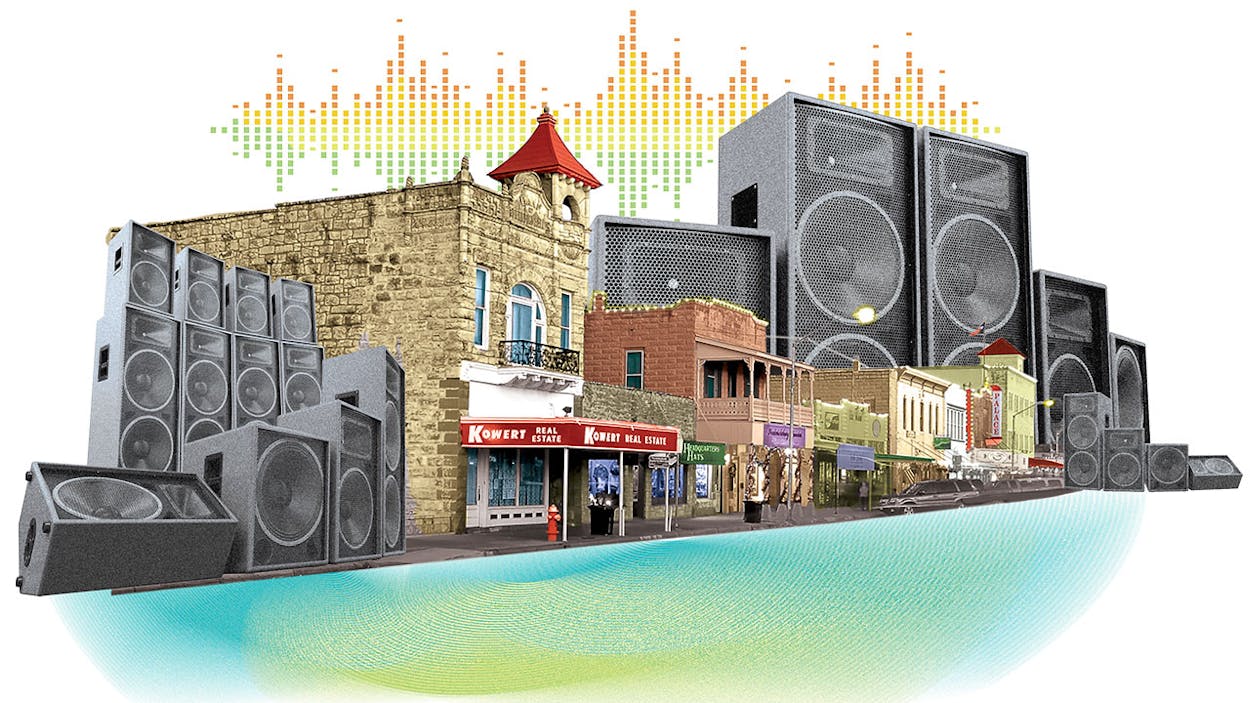Right now, Linda Langerhans, the mayor of Fredericksburg, is in a tough spot. Fritztown, as the locals call it, used to be a placid city of bed-and-breakfasts, bratwurst, and antiques stores. But it hasn’t escaped the growth afflicting Central Texas, and live music is a big draw for the tourists. These days there’s more and more of it, which is good for the venue owners in the middle of town but not so hot for the locals who live on the wide residential streets just off Main, many of whom have flooded the local government with complaints.
Fredericksburg’s sound ordinance sets different maximum volumes for different times of the day. Live music in the daytime—as measured, in many cases, from a venue’s property line—can top out at 85 decibels, which one guide to decibel-measuring says is the equivalent of the noise produced by a snowblower. After 8 p.m. the limit drops to 70 decibels (dishwasher) and after 11 p.m. to 60 decibels (air conditioner). Late last year the city council considered pushing the daytime limit down a bit, maybe to 75 decibels (vacuum cleaner). Heated public debate forestalled action, but the complaints from locals kept coming.
The sound wars have been a divisive topic in Fredericksburg for the past nine months. To some, the conflict can even be seen as an expression of the town’s essential German-ness. “Desire for Quiet May Have Cultural Roots,” read a headline in the Fredericksburg Standard-Radio Post. The item related the story of the Antilärmverein, an anti-noise society founded in 1908 in Germany. “After two world wars, the desire for quiet didn’t diminish,” the item continued, describing the love of silence exhibited by Berliners.
In mid-April the city council revived discussions about toning things down by adding the issue to the agenda of its next meeting. The blowback began immediately: on April 13 Bill Lewis, a singer-songwriter based in San Antonio, alerted his Facebook followers. “The mayor of Fredericksburg, bless her music-hating heart,” he wrote, was trying to deep-six the local outdoor music scene. His post was shared nearly 14,000 times. Many of the 759 comments that followed were aimed at Langerhans, in the brutally personal fashion that has become all too common in social media. “She’s red head, which means no soul,” wrote one commenter. “What a bitch,” wrote another. “Maybe she’s related to Hitler,” said a third.
Although its opponents treat it as the death knell of music, the proposed ordinance falls generally in line with the standards in other Texas towns. Denton, which has a bustling music scene, allows only 65 decibels, regardless of the time of day. Closer to home, New Braunfels and San Marcos allow ruckuses of up to 85 decibels, but Fredericksburg is a compact city, without an “entertainment district” as such. Anywhere that bands play, there’s likely a house nearby.
Five days after Lewis’s post appeared, irate residents began lining up outside the council hall two hours before the meeting was to start. Once the gavel fell, they took turns at the microphone and spoke their minds. One woman compared “noisemakers” to troublesome children who refuse to clean up their mess. Pastor Bobby Vitek, of Holy Ghost Lutheran Church, began with warm words. “Music is good for the soul. Necessary for the soul as well. I love music, and I’m in favor of music in our wonderful community.” But, he added diplomatically, his peace of mind had “been affected in a not great way.”
Quincy Harper, a singer-songwriter wearing a Johnny Cash T-shirt, took the mic after the pastor. “I do this for a living. My father did this for a living. My grandfather did this for a living,” he said. More restrictions would take money from his pocket and use up the police department’s time.
Pamela Taylor, a 21-year resident, complained of an incessant low beat in her living room. “If loud music is allowed to continue,” she warned, “then residents will move away from Main Street.” (“Good!” several members of the crowd exclaimed.)
At the end of the meeting it was decided that no action would be taken; the council had to think things through. But council member Jerry Luckenbach, his musically resonant surname notwithstanding, spoke up to admonish the horde. “There are some really rude and crude comments out there,” he said of the language and tone taken by many people over the previous weeks. “Don’t be like sheep and follow the leader who doesn’t even know where the hell he came from.”
Afterward, the bespectacled Langerhans, who was unfailingly polite throughout, acknowledged that all the internet name-calling was very new to her—she had to ask her daughter to show her how to find the posts and comments on Facebook. “It’s really amazing what you can do with social media,” she said. “It’s a shame we can’t do more of it for good things.”
Outside, Ben Jones, who co-owns the Coop, a new event venue on the west side of downtown, near a residential area, paced fretfully. “We’ve probably had the police called on us fifty times,” he said. His neighbors are exceedingly irate. But, he said, “at the end of the day, I’m not going anywhere. Unless somebody’s going to pay me back a hundred grand.”
The battle has been postponed, but one avenue for Fredericksburg’s musicians has been closed off: on May 7 Langerhans, facing an opponent regarded as more amenable to the town’s biergartens, cruised to reelection.
- More About:
- Politics & Policy
- Music
- Fredericksburg









